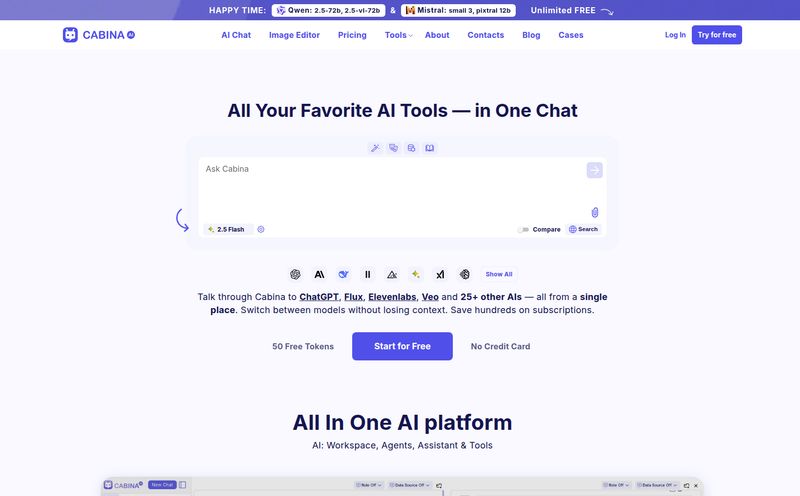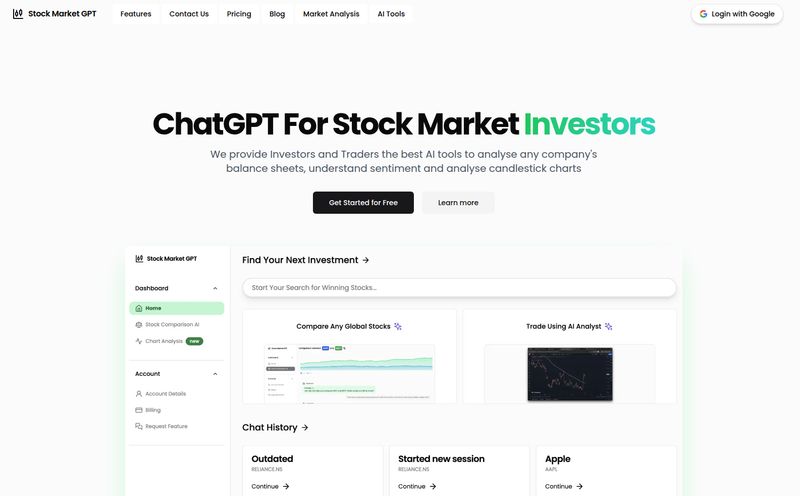If you’re in M&A, you’ve been there. It’s 2 AM. The only things keeping you going are lukewarm coffee and the sheer terror of a deadline. You're staring at a mountain of data, trying to wrestle it into a coherent Confidential Information Memorandum (CIM). It’s a soul-crushing, painstaking process that feels like it hasn’t changed in decades. Every time I've had to build one, I’ve thought, “There has to be a better way.”
For a while now, AI has been whispered about as that “better way.” But most of what we’ve seen has been... underwhelming. Generic chatbots that don’t understand the first thing about financial modeling or due diligence. It's been a lot of sizzle, not much steak.
Then something called Benki crossed my desk. And my first reaction was, naturally, skepticism. Another AI platform promising to revolutionize finance? Sure. But then I saw who was behind it. We're talking operators and experts from places like Morgan Stanley, Amazon, Cohere, and Tencent. Okay, that gets your attention. That’s not a group of kids in a garage; that's some serious industry and tech horsepower. So, I decided to take a closer look.
What is Benki, Really? (Beyond the Marketing Spiel)
At its core, Benki is an AI platform built specifically for mergers and acquisitions teams. It’s not trying to be everything to everyone. It’s a specialist. Its main claim to fame is its ability to help you build CIMs in days, not months. Yes, you read that right.
How? It hooks directly into your virtual data room (VDR)—the place where all the deal's sensitive documents live. From there, its AI reads, understands, and begins to generate drafts for all the essential components: the executive summary, the market analysis, and even the financial models. It’s not a magic button that spits out a perfect final document. Think of it more like a hyper-intelligent, incredibly fast junior analyst. It does the grueling first 80% of the work, freeing up your senior team to focus on strategy, verification, and the high-value details that actually win deals.

Visit Benki
The Soul-Crushing Grind of CIMs and How Benki Changes the Game
Crafting a CIM is an art form, but it's one painted with the brushes of tedium and repetition. You're pulling data from hundreds of files, trying to synthesize it into a compelling narrative, all while making sure every single number ties out. A misplaced decimal can kill your credibility. It’s a process ripe for human error, simply because of the sheer volume of work.
Benki’s approach is to automate that initial, heavy-lifting phase. By connecting to the data room, it’s not just guessing; it’s working from the source of truth. It can draft sections of the memo and structure financial models based on the actual documents provided. This dramatically cuts down on the manual copy-pasting and data entry that consumes so many hours. What used to be weeks of work by a team of analysts can be condensed into a few days of AI-assisted drafting and human-led refinement.
This isn't just about getting your evenings and weekends back (though that’s a pretty great perk). It’s about agility. In a competitive market, deal speed matters. Being able to produce a high-quality CIM faster than the competition can give you a significant edge.
It's Not Just About Speed, It's About Confidence
Here’s the thing that really caught my eye. In finance, a “black box” AI is useless. You can’t just tell a regulator or the other side of the deal table, “The AI said so.” You need to be able to show your work. This is where Benki seems to be different.
They talk a lot about “interpretable artificial intelligence” and “transparent audit trails.” This is huge. It means that for every piece of data the AI generates or uses, you can trace it back to its source document in the data room. This solves one of the biggest anxieties about using AI in high-stakes environments. It's not just faster; it's defensible. It reduces compliance risk because you have a clear, auditable path from source to output. For me, that transforms the tool from a neat productivity hack into a serious risk management asset.
“Bringing confidence back to every deal.” It’s a great line from their site, and the transparent audit trail is how they actually back it up. It’s one of the features that makes this feel like it was designed by people who’ve actually been in the trenches.
Building Your Own AI Army: The Customization Playground
Okay, this is where it gets really interesting for the power users. Benki isn't a one-size-fits-all system. It has what they call a “model customization playground.” This allows teams to create and train their own AI agents—or “virtual analysts,” as they put it. You can feed it your own proprietary knowledge sources, set specific access permissions, and assign roles. So, you could have one AI agent trained specifically for sourcing new deals based on your firm’s unique thesis and another one dedicated to conducting risk analysis on a specific industry.
This level of customization is what separates a professional tool from a consumer gadget. It acknowledges that every firm has its own secret sauce, its own way of looking at the world. Benki gives you the kitchen to cook in, rather than just serving you a pre-made meal. Its a powerful concept.
The Elephant in the Room: Let's Talk Potential Downsides
Alright, so it’s not all rainbows and unicorn stock options. No tool is perfect, and from my analysis, there are a few things to keep in mind. First, this thing is probably not for the technically faint of heart. The promise of creating custom AI agents and integrating with data rooms suggests that there will be a setup and customization process. You’ll likely need a tech-savvy champion on your team to get the most out of it.
Second, its effectiveness is entirely dependent on the quality of your data room. The old “garbage in, garbage out” principle applies here, maybe more than ever. If your VDR is a chaotic mess of poorly labeled files, Benki can’t work miracles. It needs structured, clean data to do its job well. This might force some much-needed data hygiene on teams, which is probably a good thing in the long run.
Finally, there's likely a learning curve, especially with the AI customization playground. It’s a powerful feature, but it’s not something you’ll master in an afternoon. Teams will need to invest time to really understand how to build and deploy effective virtual analysts.
What's the Price Tag on This M&A Superpower?
If you're looking for a pricing page with neat little tiers, you won't find one. Like most high-end, enterprise-grade software in a specialized field, Benki’s pricing isn’t public. You have to contact them and “Request a Demo.”
Honestly, I see this as a positive. It means they’re not selling a simple, one-size-fits-all product. They're selling a solution that likely requires consultation and a deep understanding of your team's specific workflow. The price will probably depend on the size of your team, your deal flow, and the level of customization you need. It’s a classic B2B sales model, and for a tool this specialized, it makes sense.
A Quick Nerd-Out on FinBench Arena
One last thing that I found particularly cool is a feature called FinBench Arena. It's an open-source platform for transparently evaluating financial AI models. In an industry filled with proprietary, black-box algorithms, creating an open benchmark is a bold move. It shows a commitment to transparency and a willingness to have their models tested against others in real-world financial scenarios. For the data scientists and quants on the team, this is a huge sign of credibility. It says, “Don’t just take our word for it; see for yourself.”
Frequently Asked Questions About Benki
Who is Benki actually for?
It’s designed for M&A professionals. That includes investment banking teams, private equity firms, corporate development departments, and anyone who lives and breathes deal-making and due diligence. It's not a general-purpose finance tool.
Is Benki just another ChatGPT wrapper?
From everything I've seen, no. A simple wrapper wouldn't have deep, secure integration with virtual data rooms or the ability to create custom, trainable AI agents with specific permissions. The focus on transparent audit trails also points to a much more specialized, purpose-built architecture.
How does Benki handle data security?
While their site doesn't go into deep technical specifics, the architecture itself provides clues. Integration with professional VDRs, along with features for setting user permissions and role assignments for virtual analysts, indicates that data security and access control are fundamental to the platform's design. This is table stakes for any tool in the M&A space.
Do I need to be a programmer to use it?
For the core CIM generation, probably not. It seems designed to be used by analysts and associates. However, to really harness the power of the AI customization playground and create bespoke virtual analysts, some technical aptitude or a willingness to learn will almost certainly be required.
How is Benki different from other financial AI tools?
Its main differentiator appears to be its hyper-focus on a specific, painful M&A workflow: the creation of the CIM and associated financial models. Many other tools are broader, focusing on market data or equity research. Benki is built to streamline the actual documentation and analysis at the heart of a deal.
So, Is Benki the Future of Deal-Making?
Look, the M&A world is famously resistant to change. We still rely on processes that feel archaic. But the grunt work involved in deals is reaching a breaking point. There are only so many all-nighters a human can pull.
A tool like Benki feels like a significant step in the right direction. It's not about replacing human judgment, intuition, or the art of negotiation. It’s about augmenting it. It’s about automating the mechanical, error-prone tasks so that the smart, experienced people on your team can spend their brainpower on what really matters: strategy, analysis, and building relationships.
I'm genuinely excited to see how tools like this reshape the industry. If Benki can deliver on its promise of speed, accuracy, and confidence, it might just give us all a little bit of our sanity back. And in this business, that’s worth its weight in gold.
Reference and Sources
- The official Benki website: https://www.benki.ai
- Forbes: The Future Of AI In Finance: Trends To Watch In 2024



